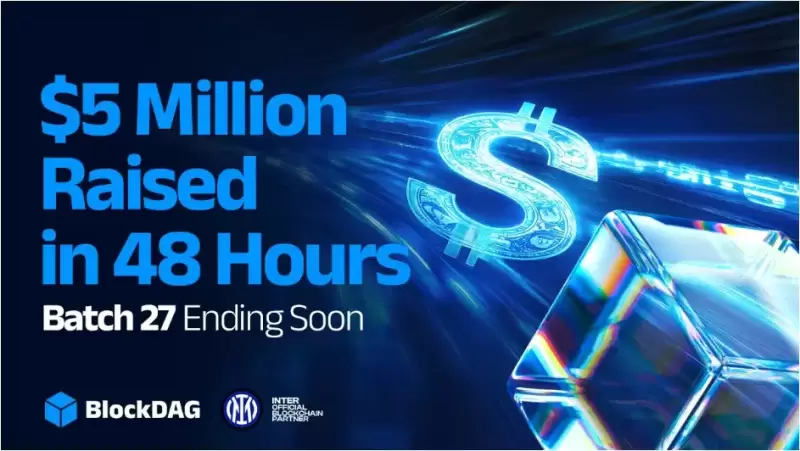 |
|
 |
|
 |
|
 |
|
 |
|
 |
|
 |
|
 |
|
 |
|
 |
|
 |
|
 |
|
 |
|
 |
|
 |
|
為了確保選舉過程的透明度和安全性,羅馬尼亞將採取前所未有的舉措,為即將於 11 月 24 日舉行的總統選舉實施區塊鏈技術。

In an unprecedented move to ensure transparency and security in electoral processes, Romania is set to implement blockchain technology for the upcoming presidential elections on November 24. The groundbreaking initiative is spearheaded by the Permanent Electoral Authority (Autoritatea Electorală Permanentă), marking a significant shift in the way votes are counted and validated in the country.
為了確保選舉過程的透明度和安全性,羅馬尼亞將採取前所未有的舉措,為即將於11 月24 日舉行的總統選舉實施區塊鏈技術。標誌著選舉過程中的重大轉變。
Romania's decision to adopt blockchain technology is a bold step towards enhancing the integrity of electoral outcomes. By employing this cutting-edge technology, the country aims to secure the voting process against tampering and fraud, providing a verifiable and transparent record of every vote cast. This approach signals a transformation in public confidence in electoral systems, setting a potential example for other nations.
羅馬尼亞決定採用區塊鏈技術是提高選舉結果完整性的大膽一步。透過採用這種尖端技術,該國旨在確保投票過程免遭篡改和欺詐,為每一次投票提供可驗證和透明的記錄。這種做法標誌著公眾對選舉制度信心的轉變,為其他國家樹立了潛在的榜樣。
Known for its robust security features, such as decentralization and encryption that prevent unauthorized modifications, blockchain technology is being harnessed to resolve longstanding electoral challenges. The implementation in Romania's presidential election underscores the importance of adopting modern solutions. This move is expected to not only improve vote accuracy but also boost trust in democratic processes among citizens.
區塊鏈技術以其強大的安全功能(例如防止未經授權的修改的去中心化和加密)而聞名,正被用來解決長期存在的選舉挑戰。羅馬尼亞總統選舉的實施凸顯了採用現代解決方案的重要性。此舉預計不僅會提高投票準確性,還會增強公民對民主進程的信任。
As Romania pioneers this technology in national elections, the potential ripple effects for global electoral practices are significant. Observers worldwide are keenly watching Romania's success, which could catalyze a broader application of blockchain in elections across different countries. This technological advancement represents a promising future for electoral integrity on a global scale.
隨著羅馬尼亞在全國選舉中率先採用這項技術,全球選舉實踐的潛在連鎖反應是巨大的。世界各地的觀察家都在密切關注羅馬尼亞的成功,這可能會促進區塊鏈在不同國家選舉中的更廣泛應用。這項技術進步代表了全球選舉誠信的光明未來。
***
***
As Romania ventures into the uncharted territory of blockchain-based voting for its upcoming elections, this pioneering effort raises compelling questions about the future of democracy in the digital age. While the nation is taking a bold leap to enhance the transparency and security of its electoral system, it's crucial to explore the broader implications of this technological evolution on societies globally.
隨著羅馬尼亞為即將舉行的選舉進入基於區塊鏈的投票的未知領域,這項開創性的努力引發了有關數位時代民主未來的引人注目的問題。雖然國家正在採取大膽的措施來提高選舉制度的透明度和安全性,但探索這項技術演變對全球社會的更廣泛影響至關重要。
Blockchain technology could fundamentally reshape how elections are conducted worldwide. With its decentralized and immutable nature, blockchain can ensure that each vote is tamper-proof and independently verifiable. This not only mitigates the risk of fraud but also exemplifies a transparent voting process that can engender greater trust among citizens. For countries that have struggled with electoral fraud and manipulation, blockchain presents a lifeline for restoring faith in democratic processes.
區塊鏈技術可以從根本上重塑全球選舉的進行方式。區塊鏈憑藉其去中心化和不可篡改的特性,可以確保每一次投票都是防篡改且可獨立驗證的。這不僅降低了詐欺風險,也反映了透明的投票過程,可以在公民之間產生更大的信任。對於那些一直在與選舉舞弊和操縱作鬥爭的國家來說,區塊鏈為恢復對民主進程的信心提供了一條生命線。
However, this advancement is not without its challenges. One significant concern is the digital divide. How can countries ensure equitable access to blockchain-based voting systems for all citizens, especially in places where technological infrastructure is lacking? The success of this technology is heavily dependent on the ability to bridge this gap, ensuring that every voter can participate in a digitally-driven electoral process.
然而,這項進步並非沒有挑戰。數位落差是一個值得關注的問題。各國如何確保所有公民公平地使用基於區塊鏈的投票系統,特別是在缺乏技術基礎設施的地方?這項技術的成功在很大程度上取決於彌合這一差距的能力,確保每個選民都能參與數位驅動的選舉過程。
Did you know that blockchain's applications extend far beyond cryptocurrency? The technology is being explored for use in areas like supply chain management, healthcare, and, as we now see, elections. Yet, the controversy surrounding its use in voting stems from both technological and ethical concerns. Critics argue about the potential for “51% attacks” where if over half of the network's computers are controlled by a single entity, they could alter the blockchain's records. Although this is theoretically implausible for large blockchain networks, the concern remains for smaller-scale deployments such as those in limited voter populations.
您知道區塊鏈的應用遠遠超出了加密貨幣嗎?該技術正在探索用於供應鏈管理、醫療保健以及我們現在看到的選舉等領域。然而,圍繞其在投票中使用的爭議源於技術和道德方面的擔憂。批評者認為存在「51% 攻擊」的可能性,即如果超過一半的網路電腦由單一實體控制,他們就可以更改區塊鏈的記錄。儘管這對於大型區塊鏈網路來說在理論上是難以置信的,但對於較小規模的部署(例如在有限選民群體中的部署)仍然存在擔憂。
Moreover, blockchain's implementation in elections may face legal and regulatory hurdles. Different countries have varying standards for electoral processes, and integrating blockchain smoothly into these systems requires navigating complex legal frameworks and ensuring compliance with existing electoral laws.
此外,區塊鏈在選舉中的實施可能面臨法律和監管障礙。不同國家的選舉程序有不同的標準,將區塊鏈順利整合到這些系統中需要瀏覽複雜的法律框架並確保遵守現有的選舉法。
One of the most significant benefits of blockchain in elections is the enhancement of vote security. Since each transaction (vote) on a blockchain is encrypted and linked to the previous one, the process becomes exceptionally secure. Additionally, the transparency of blockchain could potentially reduce the cost of election monitoring and audits, as the technology itself acts as a credential validator.
區塊鏈在選舉中最顯著的好處之一是增強投票安全性。由於區塊鏈上的每筆交易(投票)都經過加密並連結到前一筆交易,因此該過程變得異常安全。此外,區塊鏈的透明度可能會降低選舉監控和審計的成本,因為該技術本身充當憑證驗證器。
On the flip side, a considerable disadvantage is the cost and effort of initial implementation. Countries must invest in necessary technological infrastructure and train election officials and the public on how to navigate a blockchain-based voting system. Concerns about voter privacy also arise, as traceable transactions may inadvertently expose voter identities unless carefully managed.
另一方面,一個相當大的缺點是初始實施的成本和精力。各國必須投資必要的技術基礎設施,並培訓選舉官員和公眾如何使用基於區塊鏈的投票系統。對選民隱私的擔憂也隨之出現,因為除非精心管理,否則可追蹤交易可能會無意中暴露選民身分。
As countries like Romania lead the way in blockchain electoral processes, it could inspire a wave of technological adoptions that modernize voting systems worldwide. The real test will be whether these systems can demonstrate not just security, but also accessibility and reliability in diverse electoral landscapes.
隨著羅馬尼亞等國家在區塊鏈選舉過程中處於領先地位,它可能會激發一波技術採用浪潮,使全球投票系統現代化。真正的考驗將是這些系統是否不僅能夠證明安全性,而且能夠在不同的選舉環境中證明可訪問性和可靠性。
免責聲明:info@kdj.com
所提供的資訊並非交易建議。 kDJ.com對任何基於本文提供的資訊進行的投資不承擔任何責任。加密貨幣波動性較大,建議您充分研究後謹慎投資!
如果您認為本網站使用的內容侵犯了您的版權,請立即聯絡我們(info@kdj.com),我們將及時刪除。
-

- 由於造成的錯誤,一群林肯便士價值數千美元。
- 2025-04-03 13:40:12
- 今天,硬幣的一些極少數變化可能正在流通,找到一個可以帶給您大筆錢。
-

-

- 瓜達錢包評論:最好的比特幣錢包和總體最好的加密錢包
- 2025-04-03 13:35:13
- 如果您想變得環保,您需要做很多事情。如果您使用加密貨幣,這將變得更加困難。
-

- 與大多數XRP持有人不同
- 2025-04-03 13:35:13
- PALADININGING CLOUD採礦服務提供商在人群中脫穎而出,成為XRP投資者的最佳選擇。
-

- 加密交易所Kraken已在加拿大註冊為受限制的經銷商
- 2025-04-03 13:30:12
- 該註冊於週二宣布,是在需要交流的多年過程之後,以符合更高的投資者保護和治理標準。
-

- 3個加密貨幣爆炸,因為比特幣保持強大,而山寨幣則顯示出野生鞦韆
- 2025-04-03 13:30:12
- 加密價格最近在各地都在彈跳,但是一件事很明顯 - 要努力追捕穩固的項目,這是一件很明顯的錢
-

- 加密貨幣剛打電話。
- 2025-04-03 13:25:12
- BlockDag的第三個主題演講不僅丟棄更新,還觸發了資金。在僅48小時內,超過500萬美元湧入,該項目的預售總計超過2.1億美元。
-

- BlockDag(BDAG)在2025年的加密貨幣市場上占主導地位
- 2025-04-03 13:25:12
- 加密貨幣領域在2025年正在迅速發展,投資者積極尋求下一個可以帶來巨大回報的大加密貨幣。
-





























































